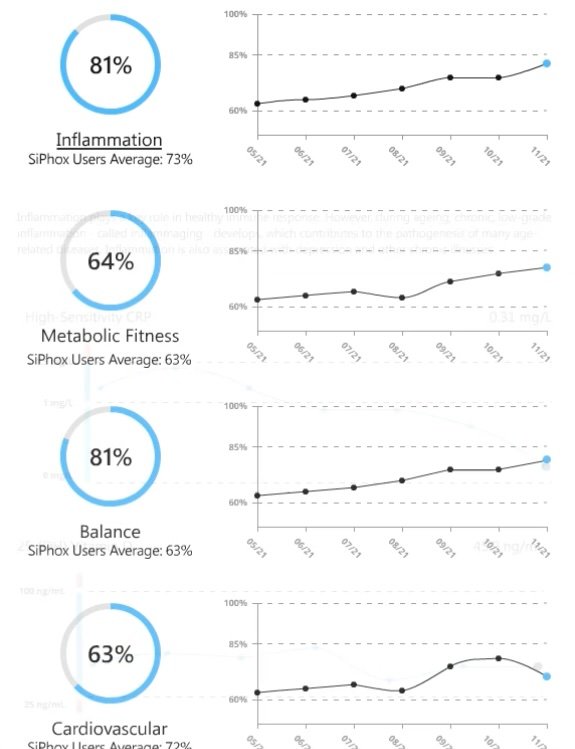Huemn Biomarker Test
The Huemn biomarker test is a comprehensive at-home health testing kit that analyzes 17 different biomarkers to provide insights into various health aspects such as inflammation, hormonal health, metabolic fitness, and cardiovascular health. It uses a small blood sample collected via a finger prick, which is then processed in a CLIA-certified lab to ensure accuracy. The results are made available on a personal dashboard, offering easy-to-understand graphs and personalized insights. This test allows for the monitoring of key health indicators and can help in making informed decisions about diet, exercise, and lifestyle to optimize health. Additionally, the kit is designed to integrate with various wearable devices, enhancing the insights through continuous health tracking.
The Huemn biomarker test is a comprehensive at-home health testing kit that analyzes 17 different biomarkers to provide insights into various health aspects such as inflammation, hormonal health, metabolic fitness, and cardiovascular health. It uses a small blood sample collected via a finger prick, which is then processed in a CLIA-certified lab to ensure accuracy. The results are made available on a personal dashboard, offering easy-to-understand graphs and personalized insights. This test allows for the monitoring of key health indicators and can help in making informed decisions about diet, exercise, and lifestyle to optimize health. Additionally, the kit is designed to integrate with various wearable devices, enhancing the insights through continuous health tracking.
The Huemn biomarker test is a comprehensive at-home health testing kit that analyzes 17 different biomarkers to provide insights into various health aspects such as inflammation, hormonal health, metabolic fitness, and cardiovascular health. It uses a small blood sample collected via a finger prick, which is then processed in a CLIA-certified lab to ensure accuracy. The results are made available on a personal dashboard, offering easy-to-understand graphs and personalized insights. This test allows for the monitoring of key health indicators and can help in making informed decisions about diet, exercise, and lifestyle to optimize health. Additionally, the kit is designed to integrate with various wearable devices, enhancing the insights through continuous health tracking.
ApoB: ApoB is a constituent of low-density lipoprotein (LDL), which is atherogenic (plaque-forming). ApoB gives us the most accurate estimate of the amount of LDL in your body. High ApoB levels are associated with an increase in risk for cardiovascular events.
Cortisol: the stress response hormone that in proper amounts, works to reduce inflammation, manage blood sugar, manage the breakdown of macros, and control sleep cycles. Elevated levels can be an indicator of chronic stress, a dysregulated circadian rhythm or a more serious health condition.
DHEA-s: Dehydroepiandrosterone (DHEA) is a hormone produced by the body's adrenal glands. The body uses DHEA to make androgens (like testosterone) and estrogens, the male and female sex hormones.
Estradiol: a form of estrogen produced primarily in the ovary. Low estradiol may be found in menopause, adrenal failure, ovarian failure, pituitary failure, and Luteal Phase Deficiency (LPD). High estradiol may be found in pregnancy, ovulation, the second half of the menstrual cycle, congenital adrenal hyperplasia, some hormone-producing tumors of the ovary, Polycystic Ovary Syndrome (PCO), Amenorrhea-Galactorrhea Syndrome, and liver disease.
Ferritin: a protein that stores iron inside your cells. A ferritin blood test is used to help check your iron levels. A lower-than-normal ferritin level indicates that one is iron-deficient, which may lead to iron deficiency anemia, weakness, fatigue, cold extremities and dizziness.
TSH: stands for thyroid stimulating hormone. It can tell you if it’s overactive (hyperthyroidism) or underactive (hypothyroidism). The test can also detect a thyroid disorder before you have any symptoms. If untreated, a thyroid disorder can cause health problems.
FSH: Follicle-Stimulating Hormone (FSH) helps manage the menstrual cycle and stimulates the ovaries to produce eggs.
HbA1c: the indicator of the body’s insulin production, or lack thereof. This number is an indicator or pre-diabetes or diabetes.
hs-CRP: High-sensitivity C-reactive protein (hs-CRP) is a nonspecific inflammatory marker. It is particularly suited to testing for chronic inflammation (long-term, low-level), as opposed to ordinary CRP, which measures acute (short-term) inflammation.
HDL: Measures the amount of cholesterol carried by high-density lipoprotein (HDL) particles in the blood. Too much cholesterol in your blood can cause fatty material to build up in your artery walls. This can lead to a heart attack or stroke.
Homocysteine: Homocysteine is one of the amino acids that play a role in the metabolism of proteins. Too much is toxic, and too little results in metabolic problems. High homocysteine is a strong and modifiable risk factor.
Insulin: Insulin is the most important marker for metabolic health. It is a hormone produced in the pancreas that moves blood sugar (known as glucose) from your bloodstream into your cells.
LDL: This marker measures the amount of cholesterol carried by low-density lipoprotein (LDL) particles in the blood. Too much cholesterol in your blood can cause fatty material to build up in your artery walls. This can lead to a heart attack or stroke.
Testosterone: Testosterone is the main sex hormone in men and plays a crucial role in men's general health and quality of life. Healthy testosterone levels are critical for many bodily functions.
Triglycerides: Triglycerides are the main component of dietary fat and fat deposits in animals. They also serve as an energy source. Triglyceride levels that are above normal ranges increase the risk of vascular plaque deposition. This leads to an elevated risk for cardiovascular events and pancreatitis.
Vitamin D: crucial in supporting the immune system, reducing inflammation, supporting bone growth, and overall health. Over 40% of Americans are Vitamin D deficient, which makes it an important biomarker to test for and track.
ApoA1: ApoA1 is a protective molecule that acts as an antioxidant and lowers inflammation. The more ApoA1, the lower the risk of cardiovascular disease.



